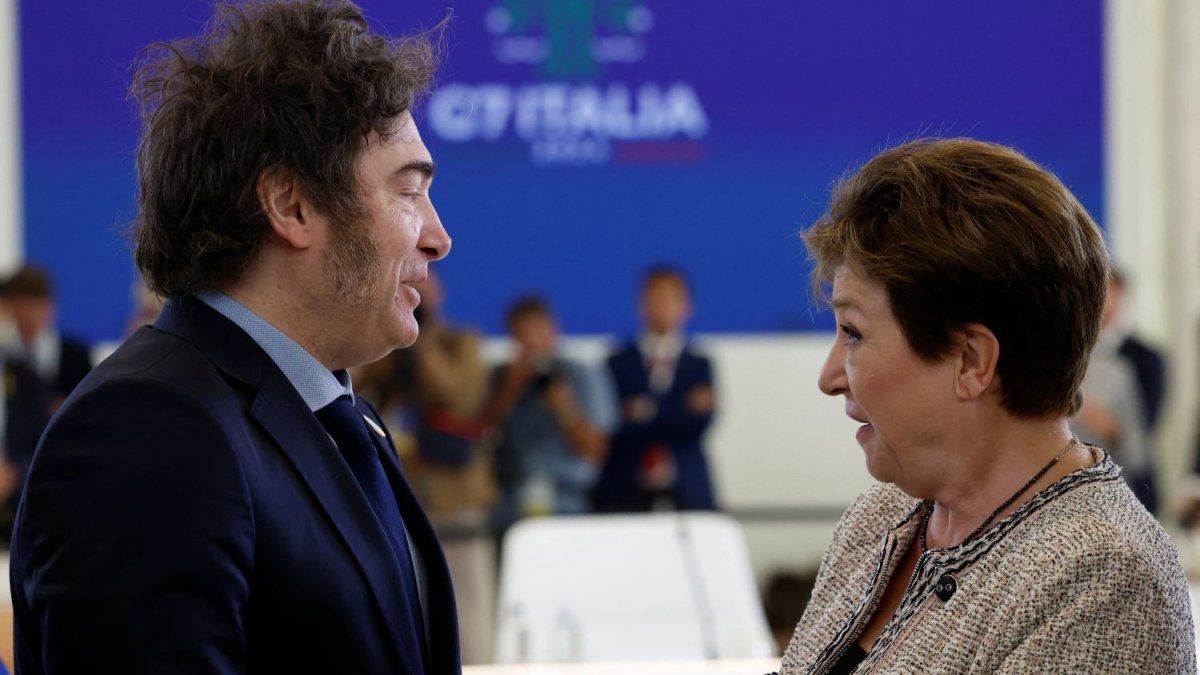The Government is excited about the possibility of reach an agreement with the IMF before the end of the year. It is the information that circulates in Washington and to which Scope was able to access. The talks seem to be just getting started, although There is still no formal request from Argentina. so that both parties can jointly analyze the conditions of a new agreement.
In this sense it will be vital President Javier Milei’s trip to New York on September 23, to give his first speech at the United Nations. High-level meetings with the IMF and the World Bank are not ruled out, which could mark the start of formal talks, if there is any progress in the technical talks.
One of the main reasons that urges Argentine negotiators is the upcoming change of government in the United States. The elections are on November 5th and it is expected that, whether Kamala Harris or Donald Trump wins, numerous changes in officials could be reflected in the most sensitive positions in the State Department and the Treasury, both influential in the approval of a new agreement with Argentina, via the IMF board. The date on which the new administration will arrive at the White House is January 20, 2025.
Valdés’ departure, a sign that there are no excuses
The postponement of the negotiations of Rodrigo Valdés, the IMF official accused by Milei of having “bad intentions”, was one of the signals that the government was waiting for, but not the only one. “Although Valdés does not feel special sympathy for Argentina, he is one of the most valuable officials that the IMF has and ultimately, he is still the boss of the deputy director Luis Cubeddu, who is supposed to be in charge of the conversations but who was already promoting them in practice.” The speaker is a source from the US government very close to the conversations between Argentina and the organization, who asked to remain anonymous. This source told Ámbito, in the last few hours, that The symbolic departure – announced by the IMF itself – of Rodrigo Valdés, director of the Western Hemisphere Department, from the negotiating table with Argentina, might not be so relevant, if, as it seems, Valdés will closely follow everything that is agreed..
However, the same source highlights something essential: the pressure on the IMF to build bridges with Argentina came, in part, from the United States Treasury Department, the main shareholder of the IMF, something that is taken into account by everyone when it comes to speeding up the talks.
Valdés has been the director of the Western Hemisphere Department for over a year, one of the most important positions in the Fund because it controls all the programs for Latin American countries, and had expressed general support for the direction of the economic program at the beginning of the year, although he had raised objections. These objections are the same ones that the entire technical line of the IMF is raising today in different conversations, above all, improving the “quality” of the fiscal adjustment that Argentina is carrying out.
The IMF wants to know which economic plan can get political support
Ultimately, and according to what Ámbito was able to reconstruct, the conversations at different levels continue, for now, without a formal request from Argentina. They are soundings that would seek to bring positions closer together but that, for the moment, have not been able to establish what elements of the economic plan President Javier Milei can commit to and that the IMF staff wants to subsequently submit to the board for consideration. There is an essential element in the entire decision-making process that undoubtedly includes the United States Treasury Department: Beyond the drop in inflation, everyone wants to see if there is some evidence that the “Milei plan” is working, support from Congress, social peace and economic results – growth, job creation – as a guarantee of eventual help with “new money” from the IMF and the signing of a new agreement will not be in vain.
In fact, the IMF itself made it clear to Argentina that the pressure to define a new program with the organization is not such, since once the program between Argentina and the IMF concludes at the end of the year, the Fund could endorse the strategy of holding talks without a program with the organization throughout 2025, to resume repayment of the loan – under the new conditions – in 2026.
However, sources close to the organization underline something important: lThe pressures that the Argentine economy and the financial front in particular could suffer – the question of how long it can hold out – if the government of Javier Milei decides to face the year 2025 without a closed agreement and without financing in sight.
Devalue, accumulate reserves and guarantee debt repayment
A central element in the discussions is that President Javier Milei would not be in a position to make the necessary changes that the organization is asking for in exchange for “new money” within the framework of the new program with the IMF.
According to what Ámbito was able to reconstruct, the Argentine government informed the organization – but also the United States Treasury Department – that The priority in the coming months will be to maintain inflation at levels considered “low”preferably in the range of 2% per month. The novelty is that the IMF is in favour of this strategy and is willing to support it if, as it seems, the Casa Rosada maintains its commitment to respect the fiscal anchor and “improve the quality” of the reforms.
As was written yesterday in this column, the IMF is aware that The Government needs popular support to arrive in good shape for the midterm elections to achieve something fundamental: the fiscal reforms necessary for a zero deficit to be “sustainable” over time via its approval in Congress. This is where the IMF’s greatest concern lies.
The question is whether President Milei could eventually get through 2025 without a new Extended Fund Facility. Doing so would give him the chance to not have to report every three months in the immediate future, but would put greater pressure on the country risk measurement, which weighs Argentina’s ability to meet debt maturities.
A program that does not exhaust the committed debt: a novelty
Aside from the geopolitical issues – the fight with China, Argentina’s strategic location in that dispute and the provision of critical minerals – that today weigh heavily on the US government’s agenda to support any proposal made by the IMF staff on an eventual agreement with Argentina, there is an additional element that must be taken into account: at this time, the IMF imagines that the Argentina’s new program should not necessarily exhaust, in its structure, the repayment of the total loan that the country still owes. This is relevant. The IMF understands that the new structure of the Extended Fund Facility (EFF) program with Argentina should have at least two basic conditions, one of them, that Argentina can repay at least a minor part of the loan during the next program and the second, that the country regain access to the international financial market in order to refinance its debt. With these two conditions, according to Washington, Argentina could sign a new program and obtain up to US$15 billion more, which should enable the possibility of lifting the exchange rate restrictions at some point.
The exchange rate trap: with the help of the IMF and a loan from banks
The exchange rate restriction is another central point in the framework of the relationship with the IMF. The organization thinks that there is a kind of “trap” in which Minister Luis Caputo finds himself and that could be summarized in this double-entry equation: if the Government allows the financial dollar market to be supplied with dollars, it is likely that the gap with the official dollar will shoot up and this will again generate an inflationary rebound that will put public support for Javier Milei under pressure, which would eventually hit the possibilities of having a good electoral result and making the fiscal reforms that the organization is asking for to give “sustainability” to the zero deficit.
But if it continues selling dollars – the product of the liquidation of exports – the accumulation of reserves in the Central Bank becomes a pipe dream. The fact to be taken into account is that the organization contemplates the possibility that Argentina will arrive at the next program with the IMF without lifting the restriction and that the new disbursement will be the opportunity to undo this exchange restriction. With reserves, the organization understands, it would be much easier to lift the exchange restriction. The novelty is that the IMF would be willing to consider this sequence, first the disbursement, then the exchange rate unification.if the Government offers a roadmap, a plan, that includes a commitment to a better quality fiscal balance – not a mere cut in the social security budget – and a “consistent” monetary and exchange plan
Source: Ambito




